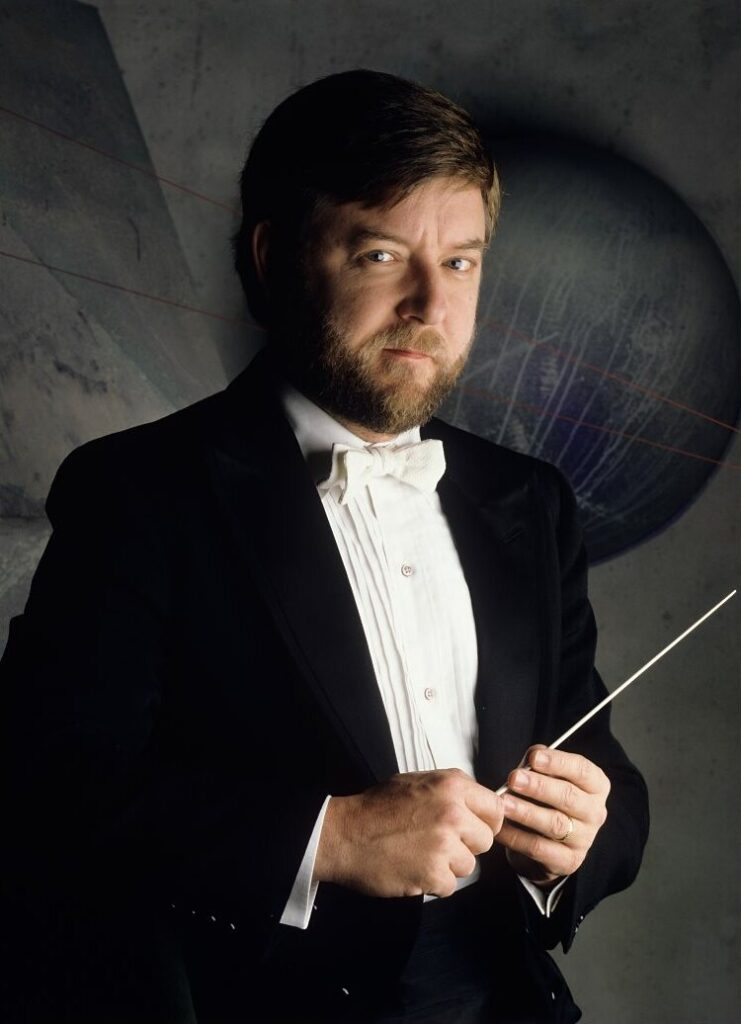Endnotes, June 2024
In this edition: a farewell to Sir Andrew Davis; rare English works on the EM Records label; Nielsen from Bergen
Sir Andrew Davis, British international conductor of the BBC Symphony Orchestra, and Toronto, Melbourne, Chicago and Royal Stockholm orchestras, 1944-2024.

Portrait photo of Sir Andrew Davis, credit Wikipedia
For Proms devotees of the 1980s and ‘90s, the conductor Sir Andrew Davis was one of those charismatic presences which shaped that famous summer Festival. Born in Hertfordshire in 1944, Andrew Frank Davis was destined for a prominent career in music. An organ scholar at Cambridge. Sir Andrew later recalled how his tutors told him ‘to specialise’ — a particular form of discipline that he actually wanted to avoid. Hopeful of conducting engagements and of making a name as an exponent of the atonal Second Viennese School, he also remembered how surprised he was to be drafted in, not for Anton Webern, but for a Classics for Pleasure recording of Rule, Britannia! — a work that was destined to travel with him throughout his life, as he went in to conduct the Last Night of the Proms on more than ten occasions.
Music by British composers, especially Elgar, Vaughan Williams and Tippett, drew some of the finest performances from Sir Andrew, yet he turned his hand to Beethoven, Brahms, Sibelius, Nielsen, Mahler, Schoenberg with equal dedication and feeling. At the 1990 Proms, in tribute to his late predecessor at the BBC Symphony Orchestra, Sir John Pritchard, he conducted Mahler’s ‘Resurrection Symphony’; and, like Sir John, delighted in the huge, resonant late-romantic works which could fill the Royal Albert Hall, both in sound and in audience numbers.
Sir Andrew Davis carved out a glittering international career with the Toronto, Chicago and Melbourne Symphony orchestras; and productions, including Gilbert and Sullivan, at the Chicago Lyric Opera. Famously, he once sang the Last Night of the Proms conductor’s speech to a G & S tune and appeared at the 1988 Last Night festivities with a life-size cardboard cut-out of Australian composer, Percy Grainger. (Percy Grainger’s very own piano roll was used in a performance of the Grieg concerto!)
Renowned for his good humour and wit, Sir Andrew was once likened, by a past member of the LPO choir, to a ‘jolly geography teacher’; a description which showed how much this conductor was liked by the musicians who worked with him. The Royal Albert Hall will be an emptier place without him.
Having said goodbye to one of our great conductors, how heartening to see so many talented British conductors now making great strides on the international and national stage. Edward Gardner, for example ~ just like Sir Andrew Davis ~ has earned a fine reputation for his BBC Symphony concerts, and for a cycle of Nielsen symphonies on the Chandos label. Most recently, Gardner has completed a production with one of Norway’s leading ensembles, the Bergen Philharmonic, of Nielsen’s Third Symphony (1910-11), coupled with the ‘Pastoral Scene for Orchestra’ Pan and Syrinx, and the Concerto for Flute and Orchestra ~ with Adam Walker as the (brilliant) soloist. Anyone who remembers this musician’s playing of the flute part in Walton’s Symphony No. 1, third movement, at the Proms a year ago, will understand the use of the word brilliant.

Dankvart Dreyer (1816-1852), view of Funen, 1843
Nielsen’s Symphony No. 3, subtitled Sinfonia Espansiva, contains one of the most mysterious and enchanting movements of the early-20th century period: a long, languid meditation ~ filled with summer breezes ~ with a hypnotic vocalise at its height, performed here by Lina Johnson (soprano) and Yngve Soberg (baritone). As ever with Chandos records, the sound-engineering is immaculate, capturing the Bergen orchestra’s rich timbres; yet the ushering in of the two voices at that magical point in the movement is a little jolting ~ not quite as subtle or seamless as it is on another Chandos disc devoted to the same piece from a couple of decades ago, conducted by Rozhdestvensky. Nevertheless, a notable recording of a symphony that is not aired enough.
John Andrews, a regular with the English Music Festival, is another fine British talent who wields the baton on an EM Records disc of rare repertoire: Quilter, Delius, Havergal Brian, Alexander Mackenzie, Cyril Scott, Norman O’Neill’s La BelleDame sans Merci and another ‘scena’, the Norse saga of 1898-1900 by Holst, Ornulf’sDrapa ~ sung by that resonant baritone voice, Roderick Williams. In an essay by music writer, Stephen Banfield (written in 1990 for Deutsche Grammophon), he states that O’Neill, Cyril Scott et al belonged to a ‘doomed milieu’ of ‘lop-sided’, monstrously sized orchestrations, enveloped in theosophy, esoterica and mysticism. Only Holst, argued Banfield, with his suite, The Planets, emerged from this lost world. Yet as we can see and hear from the new disc, it is now clear (thanks to the English Music Festival) that many works, even by Holst ~ thought lost or just beyond salvation ~ can now be given a completely fresh evaluation and appreciation.
The BBC Concert Orchestra plays with strong conviction, especially in Mackenzie’s stirring, romantic Colomba of 1898; and as sensitive accompanists to violinist Rupert Marshall-Luck, whose orchestration of Havergal Brian’s Legend adds further period feel to an important collection.
CD details:
Nielsen, Symphony No. 3, Flute Concerto, Chandos CHSA 5312.
Quilter, Delius, O’Neill et al, EM Records, EMR CD085.
Stuart Millson is the Classical Music Editor of The Quarterly Review











A moving tribute to Andrew Davis that is so welcome from a discerning and honest writer.